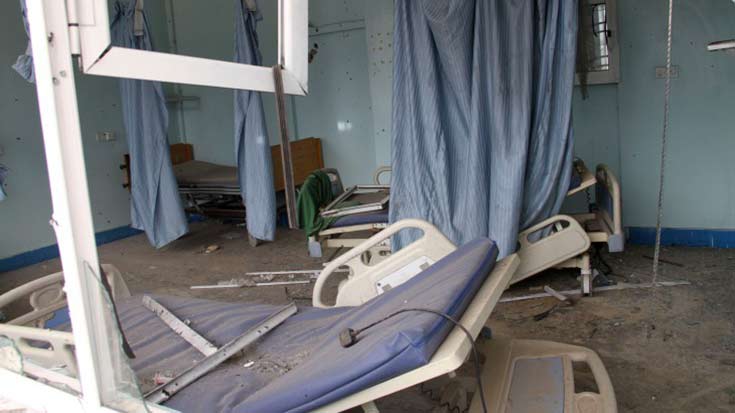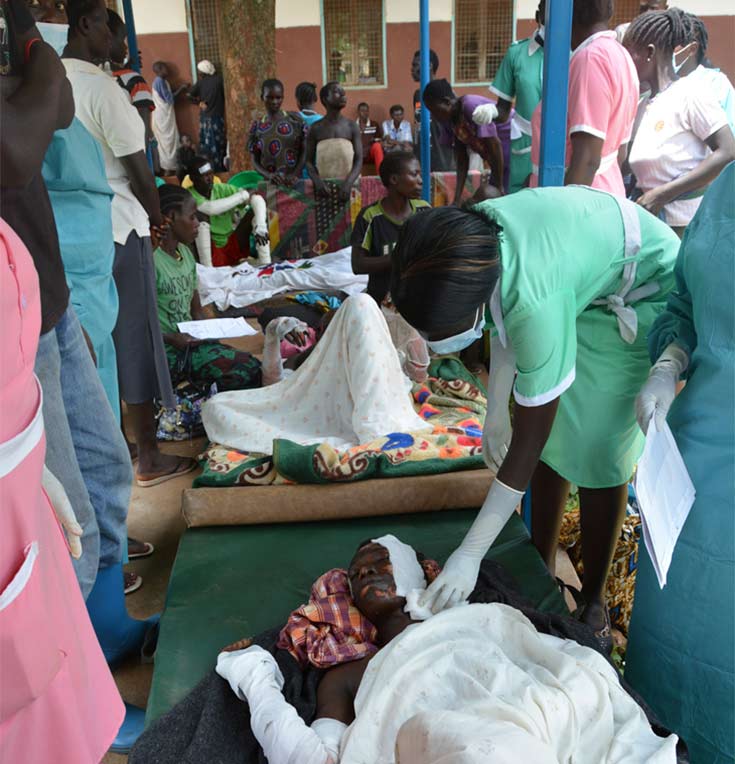Pledging to make hospitals safe havens
Dr Eric de Roodenbeke, CEO of the International Hospital Federation (IHF), outlines his thoughts on increasing the resilience of hospitals and ensuring they are safe havens.

Al-Thawra hospital in Taiz city, Yemen: The three patients who had been laying in this room were pulled out of their beds when the shelling started (CC BY-NC-ND/ICRC/W Al Absi)
Hospitals embody our sense of humanity and our compassion for those who are suffering. If we are to care for patients we need to ensure that hospitals are safe. Unfortunately, this is often not the case in contemporary conflicts and emergencies. We at the International Hospital Federation (IHF) https://www.ihf-fih.org became involved in the Health Care in Danger http://healthcareindanger.org/ initiative because we believe that by working together we can ensure better, safer delivery of healthcare. This approach will also help our members handle the threats they face to keeping their hospitals operational and continue providing proper care for their patients.
We recently attended the thirty-second International Conference of the Red Cross and Red Crescent – an opportunity to make the delivery of healthcare safer. The IHF was impressed by the participants' dedication – whether they represented governments or the ICRC. The discussions reflected a deep commitment to the core values of the Geneva Conventions, although many attendees, myself included, were disappointed by the lack of consensus to support the ICRC draft resolution on strengthening compliance with international humanitarian law.
However, these discussions are ongoing and the resolution adopted sends a clear message to civil society: we need to mobilise and play a stronger role at both the global and national level to urge governments to abide fully by international humanitarian law and to investigate and punish any breaches. This call for mobilisation and co-operation is also strongly present in Resolution 4 on protecting the delivery of healthcare. Making a pledge to support the Health Care in Danger initiative is an opportunity for the IHF to respond to those calls and mobilise our members on two major issues: Increasing the resilience of hospitals and ensuring hospitals are safe havens.
Increasing the resilience of hospitals
If hospitals are to cope with increased man-made and environmental risks, they must improve their resilience. This requires accurate risk assessment and contingency planning, as no healthcare provider can fulfil its mandate without preparedness activities and drills. It's about changing the mindset: making resilience part of daily operations and the decision-making process.
The IHF has been deeply involved in the global consultation process under the Health Care in Danger initiative. Preparedness was a major theme of the recommendations and measures developed by the experts and professionals who took part. Together with World Health Organisation, the ICRC and Médecins sans Frontières, we are currently exploring ways to translate these recommendations into a rapid assessment and planning tool for hospitals. We are doing this by building on existing tools, such as the Hospital Safety Index.

An evacuation queue in South Sudan, Equatoria State, Maridi: Patients with their caretakers await their turn to be taken to Juba (CC BY-NC-ND/ICRC/L Horanieh)
Preparedness in peacetime is key if we want hospitals to be considered safe havens and be protected as such. It's about making sure that the core principles of the neutrality and inviolability of hospitals are accepted and shared by the population as a whole in peacetime and that they are upheld by all parties, regardless of allegiances, in times of conflict. This is crucial, because we can reasonably assume that the threat levels will be higher in armed conflict than in peacetime.
Although we do not have the authority to require our members to honour the pledge, we will encourage them to report back annually on the measures taken.
We believe that setting up a partnership between all major professional associations – achieved at the global level by the Health Care in Danger initiative – is the right approach for improving the safety and resilience of hospitals. The challenge is reproducing this approach in each country, where these issues can be much more sensitive. But preserving a place for humanity in armed conflict is worth the effort.
Dr Eric de Roodenbeke is the CEO of the International Hospital Federation (IHF), a global association of healthcare provider organisations. The IHF encourages members to exchange knowledge and experience and address issues related to the operations, practices and policies of healthcare facilities.
Dr Eric de Roodenbeke, 14/03/2016